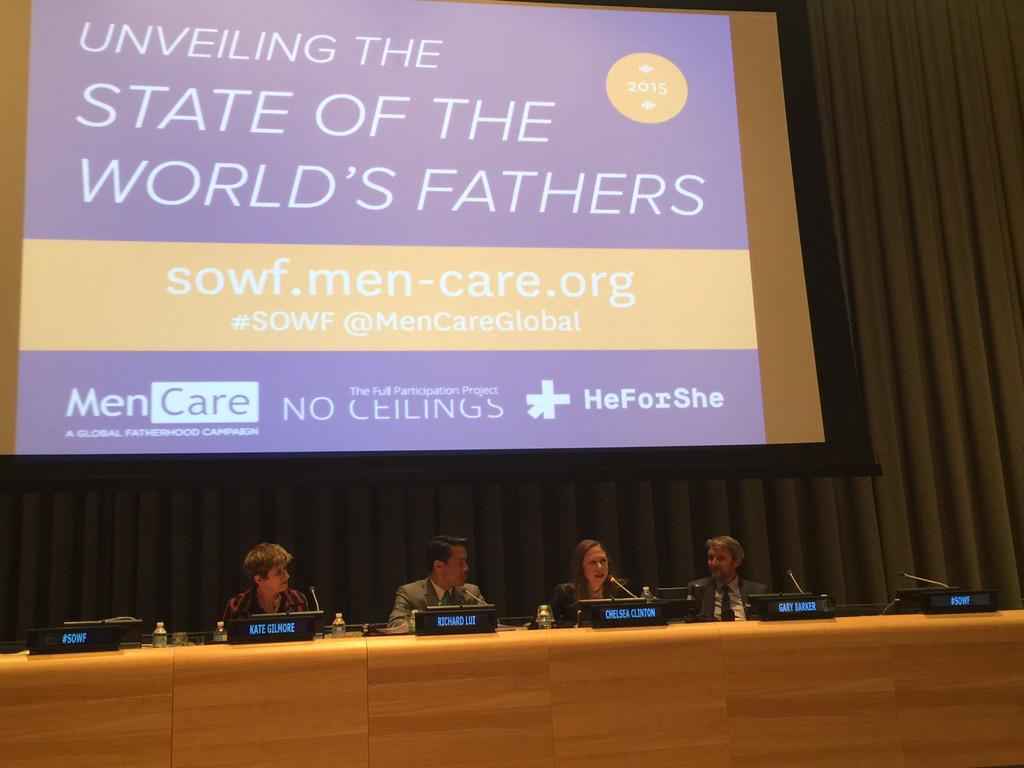The
first-ever State of the World’s Fathers (SOWF) report has been presented
today at the European Parliament under the framework of the global MenCare fatherhood
campaign at a roundtable discussion organised by the S&D Group and Make
Mothers Matter. This report is a landmark analysis of fatherhood that draws
evidence from hundreds of studies covering all countries in the world with
available data.
The SOWF report is
intended to provide a periodic, data-driven snapshot of the state of men’s
contributions to parenting and care giving globally by addressing four issues
related to fatherhood: unpaid care work in the home; maternal, newborn, and
child health and sexual and reproductive health and rights; men’s care giving
and violence against children and women; and child development.
Some of the key
findings of the SOWF report:
1.
Fathers
with close connections to their children live
longer, have fewer health problems, are more productive and generally happier.
2.
Moreover, fathers
matter deeply to the development of their children and targeting them is key in
achieving gender equality.
3.
More information about the benefits of
fatherhood for men, women and children – specifically, research on what children need to thrive – is urgently needed and could prove
instrumental in guiding effective policy changes.
“This first State of the World’s Fathers report reaffirms that fathers matter for
children and that care giving is good for fathers,” says Gary Barker, SOWF
report author and International Director, Promundo.
The SOWF
report reveals long-lasting disparities.
Women continue to spend between 2 to 10 times longer than men caring for a
child (or older person). These inequalities persist despite the fact that women
today make up 40% of the formal global workforce and 50% of the world’s food
producers. While it is increasing, men’s unpaid care giving has not kept pace
with women’s participation in the labor force.
There is no
country in the world where men and boys share the unpaid domestic and care work equally with women and girls. As a
consequence, women lose opportunities for work and income, and girls are often
held back from educational opportunities, which exacerbates gender inequality
and gendered poverty. A lack of supportive policies, particularly paternity
leave for new fathers, is part of the problem. While maternity
leave is now offered in nearly all countries, only
92 countries offer leave that can be taken by
new fathers; in half of these, the leave is less than three weeks.
“MMM welcomes the SOWF report as a major step
towards the recognition of unpaid family care work traditionally performed by
mothers. Gender equality will never be achieved if the care activity is
not shared, valued and recognized as a mothers’ and fathers’ contribution to
society,” says Anne-Claire
de Liedekerke President of Make Mothers Matter. “We are looking forward to collaborate with MenCare and to promote the
role of fathers due to the positive effects on children’s development and
education, on mothers and on fathers.”
Paid and non-transferable leave policies for fathers, when well designed, have the potential to increase
men’s participation in caregiving. In the
United Kingdom, fathers who took leave after birth were 19% more likely to
participate in feedings and to get up with the baby at night 8 to 12 months
later, as compared with those who did not take leave. A
study from Sweden showed that every  month that fathers took paternity leave increased the
mother’s income by 6.7%, as measured 4 years later, which was more than she
lost by taking parental leave herself.
month that fathers took paternity leave increased the
mother’s income by 6.7%, as measured 4 years later, which was more than she
lost by taking parental leave herself.
"Fathers have everything to win by
taking care of their children, from every point of view. Member States in
particular need to support the S&D group in its will to create a paternity
leave of at least 10 days fully paid and to improve the use of the parental
leave," says Marie Arena, S&D coordinator of the
Women's rights and gender equality Committee and rapporteur for the Maternity
Leave Directive.
“When fathers take on their fair share of the unpaid care work, it can
alter the nature of the relationships between men and women and children, as
both fathers and mothers will have more time for their children, women are
released from some of their ‘double burden,’ and fathers get to experience the
joys, satisfactions, and stresses of caring for their children,” says Nikki van der Gaag, feminist and SOWF
report author.
Download the full SOWF report here: http://sowf.men-care.org/
Source: Press Release

No comments:
Post a Comment